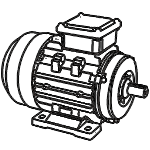Tel: +86-177 3033 8505 Correo electrónico: [email protected]
Reciclaje de aluminio
El mercado demanda aleaciones cada vez más ligeras y eficientes, Convirtiendo el aluminio en el metal del futuro por excelencia. Su recuperación es importante desde el punto de vista económico.

Reciclaje de aluminio
Antes de los molinos de martillos es posible instalar una trituradora primaria, una trituradora de doble eje de la serie WLP de los volúmenes y para hacer más rápida la reducción por el molino de martillos.
Una variedad cada vez mayor de objetos, Los productos y componentes están fabricados en aluminio o en sus aleaciones primarias y secundarias. Sus características hacen que este metal sea esencial tanto en la construcción de muchos objetos comunes (Bicicletas, Windows, Cafeteras, etcetera.) y para componentes tecnológicamente avanzados y complejos (Trenes, Coches, Computadoras, aviones y aún más). Como no existe en la naturaleza, El aluminio se recicla desde entonces 1900. Sobre todo en la actualidad Economía circular Desempeña un papel importante. El Reciclaje de aluminio, ya sea de perfil o de carcasa, significa dividirlo de todos los componentes con los que se ensambla. Uno de los ejemplos más comunes es el reciclaje de marcos de ventanas de aluminio que incluyen tornillos, vidrio, Mangos y plástico con funciones térmicas.
Las operaciones de rectificado pueden separar completamente los materiales adicionales para preservar la aleación primaria de aluminio, Una solución ideal con respecto a un proceso que implica una fundición que podría crear aleaciones secundarias menos valiosas. En nuestras plantas de reciclaje se utilizan dispositivos de clasificación por rayos X para una mejor selección de la calidad de la aleación de aluminio. Separan el aluminio primario del aluminio secundario, Una distinción esencial para un mejor rendimiento durante la fundición en la fundición.
Más información sobre todas nuestras soluciones de reciclaje!
¿Cuál es su
tratamiento
requisito?
Escuchamos sus necesidades y podemos suministrarle las mejores tecnologías para cumplir con sus objetivos comerciales.
Los ciclos de procesamiento están diseñados para maximizar las actividades de producción, Ser capaz de lograr la plena recuperación de las materias primas secundarias y reintroducirlas directamente en el ciclo económico.
PONTE EN CONTACTO
WALI recupera y recicla recursos valiosos en la cadena de suministro.
 Trituradora Wali
Trituradora Wali








